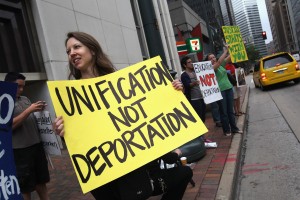
There are currently about 300,000 undocumented immigrants in the U.S. facing deportation. Yesterday, the White House announced, in both a post on the White House blog and in a letter (.pdf) to Senate Democrats from Homeland Security Chief Janet Napolitano, that the Obama administration would de-emphasize proceedings against "low-priority" undocumented immigrants.
These cases include "individuals such as young people who were brought to this country as small children, and who know no other home, [and] individuals such as military veterans and the spouses of active-duty military personnel."
The post goes on:
DHS, along with the Department of Justice, will be reviewing the current deportation caseload to clear out low-priority cases on a case-by-case basis and make more room to deport people who have been convicted of crimes or pose a security risk.
And they will take steps to keep low-priority cases out of the deportation pipeline in the first place. They will be applying common sense guidelines to make these decisions, like a person’s ties and contributions to the community, their family relationships and military service record.
Today, the Department of Homeland Security released the letter sent by Secretary Napolitano to Democratic Majority Leader Harry Reid and others.
...we have initiated an interagency working group to execute a case-by-case review of all individuals currently in removal proceedings to ensure that they constitute our highest priorities. The working group will also initiate a case-by-case review to ensure that new cases placed in removal proceedings similarly meet such priorities. In addition, the working group will issue guidance on how to provide for appropriate discretionary consideration to be given to compelling cases involving a final order of removal. Finally, we
will work to ensure that the resources saved as a result of the efficiencies generated through this process are dedicated to further enhancing the identification and removal of aliens who pose a threat to public safety...
The letter cites a June 17 memorandum (.pdf) by Immigration and Customs Enforcement Director John Morton as laying out the priorities to be considered by prosecutors when considering deportation.